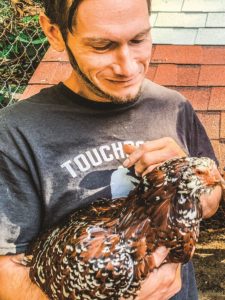WELLFLEET — Most chickens on the Outer Cape are, like the rest of us, among the fortunate on this Earth. Instead of inhabiting large-production poultry farms, our backyard babies live in tiny flocks of, typically, 3 to 12 birds. And while most of us acquired them for their eggs, they tend to hold pet status as well.
If you have named each chicken in your flock, you are probably asking yourself if they’ll ever respond when you call them. How well can you get to know these birds? Is it possible to form a relationship with them? Is it foolish to consider a chicken more than a ground-pecking, egg-laying domesticated bird with a brain that matches the size of its head?

The good news is that your flock can, without a doubt, become as fond of you as you are of each bird. It takes time and careful observation to get to know a chicken, but if you are willing to put in the effort, you will learn that your feathered friends are surprisingly intelligent creatures who have personalities as varied as those of their human counterparts.
The first thing a new flock will do, once the chicks have grown into pullets, is establish their social hierarchy, commonly known as their pecking order. Watching this process unfold will give you clues to each bird’s character. There are always dominant members of each flock. Unsurprisingly, chickens establish this order by pecking one another, though this relatively aggressive move is often their last resort.
If you have one hen that persistently pecks the others, it does not necessarily mean she is a meanie. There may simply be a number of strong personalities in your flock, so that it is taking longer to sort out which one will ultimately run the show. Other ways of displaying dominance are feather fluffing and mounting, which, yes, the ladies do like to do.
Once you recognize who the boss is, you’ll begin to notice your chickens display other commonly found personality types. There are the daredevils and the social butterflies, the intellectuals, peacemakers, broody mamas, fight-pickers — and the human-lovers. While all chickens are a joy to own, the daredevils, intellectuals, and, of course, the human-lovers tend to be favorites because they most readily interact with their people.
Even if your chickens initially resist being gently picked up, cuddled, and stroked, all end up taking to this kind of attention if you don’t give up. They like being scratched, especially on the fluffy area behind their hidden ears — chickens have small ear openings under the feathers on the sides of their heads, and beneath those, ear lobes, which do show. The color of the lobe varies by breed and gives away the color of the eggs the hen will lay.
You can establish a special bond with your ladies by feeding them out of your hand. The human-lovers will want this kind of contact with you most, and will show their affection in return by obsessively following you around.
All chickens can learn their names, but the intellectuals do so the fastest. At our backyard farm, we get a kick out of waiting to see what personalities our chickens have before naming them. We currently have Barbara Streisand, Baby Face McGurksies, Play Footsies, and Chick Malone among our ladies. I will leave it up to you to guess their personalities.



